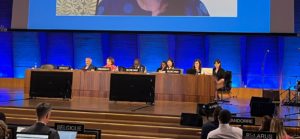IFLA Takes a Leading Role at the 4th Civil Society Forum on the 2005 Convention
25 avril 2024
On 5 June, civil society organisations came together online and in person at UNESCO Headquarters in Paris, France, for the fourth edition of the Civil Society Forum of the Convention on the Protection and Promotion of a Diversity of Cultural Expressions (2005 Convention).
Ahead of the ninth session of the Conference of Parties of the 2005 Convention, civil society met to discuss our vital role in achieving the objectives of the Convention, supporting:
- The development of policies and measures to promote creation, production, distribution, and access to diverse expressions of culture
- Measures to facilitate a balanced flow of cultural goods and services and promote the mobility of artists and cultural professionals
- The Integration of culture as an element of sustainable development
- The defense of human rights and fundamental freedoms
Held every two years, the Civil Society Forum is an important opportunity for IFLA to increase the presence of library perspectives in implementing the 2005 Convention.
The 4th Civil Society Forum
An IFLA representative took a leading role on the steering committee of this edition of the Forum, helping to elaborate the discussion topics and lead the day’s events.
The 4th Civil Society Forum explored the following topics:
- Recognising culture as a global public good: implications for sustainable development and cultural rights
- Diversity of cultural expressions in the digital environment: challenges and opportunities
- Cultural governance, public policies and commitments to the 2005 Convention

IFLA joins other civil society representatives for the presentation of the report of the Forum
IFLA chaired the final discussion on cultural governance, and helped to consolidate the day’s discussions into a final report, which was delivered to the Conference of Parties on 6 June. IFLA took the stage alongside the Secretary of the 2005 Convention and the Assistant Director General for the Culture Sector to help deliver these recommendations to Parties made up largely of national commissions to UNESCO.
Outcomes and Recommendations
Among the recommendations made by the Forum, the following key points can be noteworthy for the global library field:
Recognising culture as a global public good
The Forum called for the need for greater reflection on the declaration of culture as a global public good, namely the implication of this declaration on the understanding of the transversal impact of culture on sustainable development and the defense of cultural rights.
For libraries, the naming of culture as a global public good in the Mondiacult Declaration (September 2022) is positive. It recognises the benefit that culture can and should bring to all, as well as the importance of action by governments to ensure that this is the case. Further, the emphasis on it being a public good makes clear that access and participation must be considered as crucial. Culture cannot be a public good unless there are also universal cultural rights.
The Forum urged Member States to involve many stakeholders, such as libraries, in the elaboration of plans to uphold culture as a global public good.
Further, the Forum urged Parties to review the Zero Draft for a culture-specific sustainable development goal launched by the Culture 2030 Goal Campaign, of which IFLA is a core member.
Diversity of cultural expressions in the digital environment
The Forum examined challenges and opportunities of the digital environment, such as those posed by the rapid development of artificial intelligence and similar technologies.
The Forum called for Parties to recognize that the protection and promotion of culture and its diversity can only be achieved by protecting and supporting those who produce, promote, and protect cultural expressions – i.e. the human creators, artists, cultural organizations and professionals.
The Forum calls for a human-centric and ethical approach to AI, science and technology, whereby it is developed and used as an enhancer of human intellectual creativity rather than as a means to cut costs down and replace human artistry and knowledge.
It further called for meaningful efforts to reduce the digital divide, and to recognize that linguistic diversity is essential to protect and promote diversity of cultural expressions in the online environment.
Cultural governance, public policies and commitments to the 2005 Convention
The Forum called for more opportunities to engage with Parties to the Convention, in terms of meaningfully exchanging perspectives and weighing in on the topics of concern to civil society organisations.
More effective ways for organisations to communicate and report on civil society activities and concerns with Parties and UNESCO were suggested. Finally, the Forum called for more opportunities to engage with other stakeholders across the international legal framework, who align with the protection and promotion of a diversity of cultural expressions.
These opportunities would mean more possibilities to bring the voice of the library field into the international discourse on cultural policies and sustainable development, letting the field’s interests and perspectives be heard widely.
During the Conference of Parties agenda item on civil society, which it discussed on 6 and 7 June, Parties expressed great interest in the Forum’s outcomes, and IFLA looks forward to continuing to engage with UNESCO at the international and national levels towards implementing these recommendations.
Find out more:
Get into the 2005 Convention on the Protection and Promotion of the Diversity of Cultural Expressions
IFLA’s new guide takes a look at the Convention on the Protection and Promotion of the Diversity of Cultural Expressions, why it matters to libraries, and how to put it to use for library advocacy.
This Convention is a commitment at the global level to culture, in recognition of its importance ...
Contact: claire.mcguire@ifla.org